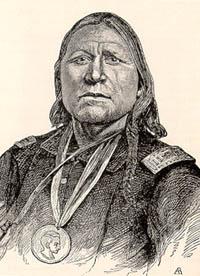 SKC Films Library SKC Films Library |
| SKC Films Library >> American History >> Indians of North America >> Tribal and Individual Biographies |
 Satanta Satanta(Set'tainte, "White Bear") Kiowa war chief known as the "Orator of the Plains" Almost nothing is known about Satanta's early life, except that he was born somewhere in the traditional realm of the Kiowa, most likely in either Kansas or Oklahoma, sometime around 1820. It is also known that his participation in campaigns against the Cheyenne and Utes, as well as his raids against white settlements as far south as Texas and Mexico, made him a respected leader among his people. So respected was he, in fact, that he was chosen as one of the Kiowa representatives at the negotiations leading to the Treaty of the Little Arkansas River (1865), which both sides hoped would result in peace between the Kiowa and whites. Unfortunately, the peace was very short-lived, as the federal government failed to keep most of its promises and white settlers continued to infringe on Kiowa lands. The broken promises led Satanta and others to lead a series of raids against whites between 1866 and 1867. In October 1867, Satanta was one of the Kiowa representatives at the Medicine Lodge Treaty Council. It was here that he became known as the "Orator of the Plains," because he could speak well in five languages. In hopes of establishing a permanent peace and providing the Kiowa with a sense of security, Satanta signed the final agreement, which called upon the Kiowa to move to a reservation in present-day Oklahoma. Animosity between the Kiowa and whites grew once again, however, as more and more white hunters killed more and more bison, and the Kiowa's chief source of food became more and more scarce. Raids on white settlements resumed in early 1868, and grew increasingly violent. The new round of raids led Gen. William T. Sherman to call upon Gen. Philip H. Sheridan to restore order, which in turn led to the brutal "winter campaign" of 1868-1869, during which the Army sought to force the Kiowa to surrender by destroying their homes, horses, and will to resist. On November 23, 1868, Lt. Col. George A. Custer decimated a southern Cheyenne village on the Washita River, killing women and children as well as fighting braves. This event was enough to convince Satanta that it was once again time to surrender. On December 17, he and fellow chief Guipago walked up to Custer under a white flag of truce, but Custer had them both arrested. In February 1869, Tene-angopte was able to secure their release by promising that the Kiowa would quit raiding and willingly return to the reservation. Although the next couple of years remained peaceful, resentment amongst the Kiowa grew as government provisions became smaller and smaller. On May 18, 1871, Satanta, assisted by Ado-eete and Satank, led a party of some 100 Kiowa against a wagon train near present-day Graham, Texas, killing seven. A few days later Satanta walked into Fort Sill and boasted of having led the raid. He, along with Ado-eete and Satank, were arrested, and subsequently sent to Jacksboro, Texas, to stand trial for murder. The trial of Satanta and Ado-eete (Satank was killed on the trip to Texas after attacking a guard) made history because it was the first time Indians were tried in a civilian court for murder. Not surprisingly the jury found both men guilty and sentenced them to death, but fear of Kiowa retribution led Governor Edmund J. Davis to commute the sentences to life imprisonment at Huntsville. As Satanta and Ado-eete sat in prison, Indian agents promised the Kiowa that both men would be released if the Kiowa could "behave themselves." Two years went by without incident, and in 1873 the government kept its promise and the two chiefs were indeed paroled. Satanta had barely returned to the reservation before the Kiowa once again went on the warpath. Although Satanta was no longer a war chief, he was a member of many raiding parties, and in the fall of 1874 he was arrested and charged with violating his parole. He was returned to Huntsville, where he committed suicide on October 11, 1878. Satanta's remains were interred at the Huntsville prison cemetery until 1963, when his grandson, Kiowa artist James Auchiah, reclaimed them and had them reinterred next to Satank in the cemetery at Fort Sill. SEE ALSO |
| SKC Films Library
>> American History
>> Indians of
North America >> Tribal and Individual
Biographies This page was last updated on 06/16/2017. |